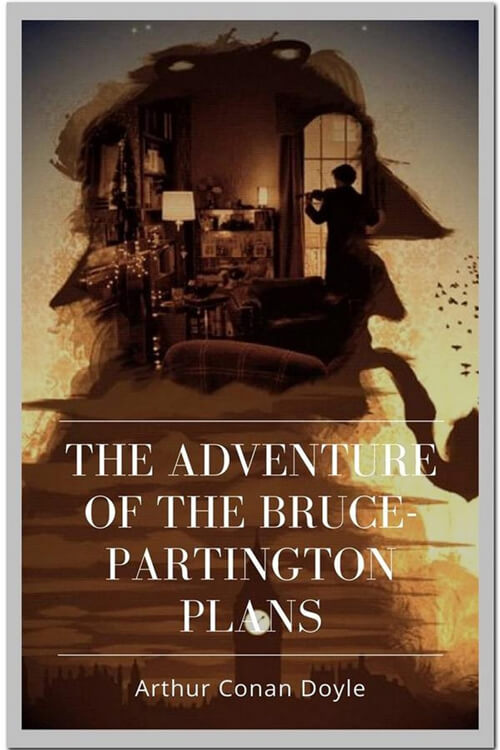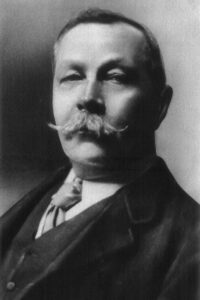
The Adventure of the Bruce-Partington Plans
In the third week of November, in the year 1895, a dense yellow fog settled down upon London. From Monday to Thursday, I doubt whether it was ever possible from our windows in Baker Street to see the loom of the opposite houses. The first day Holmes had spent in cross-indexing his huge book of references. The second and third had been patiently occupied upon a subject which he had recently made his hobby—the music of the Middle Ages. But when, for the fourth time, after pushing back our chairs from breakfast we saw the greasy, heavy brown swirl still drifting past us and condensing in oily drops upon the window panes, my comrade’s impatient and active nature could endure this drab existence no longer. He paced restlessly about our sitting room in a fever of suppressed energy, biting his nails, tapping the furniture, and chafing against inaction.
“Nothing of interest in the paper, Watson?” he said.
I was aware that by anything of interest, Holmes meant anything of criminal interest. There was the news of a revolution, of a possible war, and of an impending change of government; but these did not come within the horizon of my companion. I could see nothing recorded in the shape of crime which was not commonplace and futile. Holmes groaned and resumed his restless meanderings.
“The London criminal is certainly a dull fellow,” said he in the querulous voice of the sportsman whose game has failed him. “Look out this window, Watson. See how the figures loom up, are dimly seen, and then blend once more into the cloud bank. The thief or the murderer could roam London on such a day as the tiger does the jungle, unseen until he pounces, and then evident only to his victim.”
“There have,” said I, “been numerous petty thefts.”
Holmes snorted his contempt.
“This great and somber stage is set for something more worthy than that,” said he. “It is fortunate for this community that I am not a criminal.”
“It is, indeed!” said I heartily.
“Suppose that I was Brooks or Woodhouse, or any of the fifty men who have good reason for taking my life, how long could I survive against my pursuit? A summons, a bogus appointment, and all would be over. It is well they don’t have days of fog in the Latin countries—the countries of assassination. By Jove! here comes something at last to break our dead monotony.”
It was the maid with a telegram. Holmes tore it open and burst out laughing.
“Well, well! What next?” said he. “Brother Mycroft is coming round.”
“Why not?” I asked.
Read or download Book
Arthur Conan Doyle
Sir Arthur Ignatius Conan Doyle KStJ, DL (22 May 1859 – 7 July 1930) was a British writer and physician. He created the character Sherlock Holmes in 1887 for A Study in Scarlet, the first of four novels and fifty-six short stories about Holmes and Dr. Watson. The Sherlock Holmes stories are milestones in the field of crime fiction.
Doyle was a prolific writer; other than Holmes’s stories, his works include fantasy and science fiction stories about Professor Challenger, and humorous stories about the Napoleonic soldier Brigadier Gerard, as well as plays, romances, poetry, non-fiction, and historical novels. One of Doyle’s early short stories, “J. Habakuk Jephson’s Statement” (1884), helped to popularise the mystery of the Mary Celeste.
Name
Doyle is often referred to as “Sir Arthur Conan Doyle” or “Conan Doyle”, implying that “Conan” is part of a compound surname rather than a middle name. His baptism entry in the register of St Mary’s Cathedral, Edinburgh, gives “Arthur Ignatius Conan” as his given name and “Doyle” as his surname. It also names Michael Conan as his godfather. The catalogs of the British Library and the Library of Congress treat “Doyle” alone as his surname.
Steven Doyle, publisher of The Baker Street Journal, wrote: “Conan was Arthur’s middle name. Shortly after he graduated from high school he began using Conan as a sort of surname. But technically his last name is simply ‘Doyle’.” When knighted, he was gazetted as Doyle, not under the compound Conan Doyle.
Doyle’s first novels were The Mystery of Cloomber, not published until 1888, and The Unfinished Narrative of John Smith, published only posthumously, in 2011. He amassed a portfolio of short stories, including “The Captain of the Pole-Star” and “J. Habakuk Jephson’s Statement”, both inspired by Doyle’s time at sea. The latter popularised the mystery of the Mary Celeste and added fictional details such as that the ship was found in perfect condition (it had taken on the water by the time it was discovered), and that its boats remained on board (the single boat was missing). These fictional details have come to dominate popular accounts of the incident, and Doyle’s alternative spelling of the ship’s name as the Marie Celeste has become more commonly used than the original spelling.
Between 1888 and 1906, Doyle wrote seven historical novels, which he and many critics regarded as his best work. He also wrote nine other novels, and—later in his career (1912–29)—five narratives (two of novel length) featuring the irascible scientist Professor Challenger. The Challenger stories include his best-known work after the Holmes oeuvre, The Lost World. His historical novels include The White Company and its prequel Sir Nigel, set in the Middle Ages. He was a prolific author of short stories, including two collections set in Napoleonic times and featuring the French character Brigadier Gerard.
Doyle’s works for the stage include Waterloo, which centers on the reminiscences of an English veteran of the Napoleonic Wars and features a character Gregory Brewster, written for Henry Irving; The House of Temperley, the plot of which reflects his abiding interest in boxing; The Speckled Band, adapted from his earlier short story “The Adventure of the Speckled Band”; and an 1893 collaboration with J. M. Barrie on the libretto of Jane Annie.






